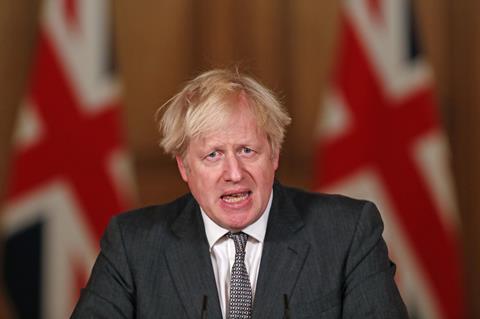The prime minister has given his personal backing to the push for continued funding of the justice system next year, the lord chief justice said today.
Lord Burnett of Maldon said he had met with Boris Johnson and received the ‘distinct impression’ he agrees with the argument that a further cash injection is required to deal with the courts backlog. The judge added that he was also ‘confident’ that lord chancellor Robert Buckland QC believes the same, ahead of crucial discussions about funding allocations with the Treasury.

Lord Burnett told the House of Lords constitution committee that the extra funding provided this year should not be a ‘sticking plaster’ for dealing with the thousands of outstanding cases in all courts.
‘It is absolutely vital in my view that as we move forward we will have to continue to sit at full capacity in all jurisdictions to enable us to retrieve the outstanding caseloads,’ added Burnett.
Last month Buckland announced that there would be no cap on judicial sitting days this year to maximise capacity across the justice system. In 2010, there were 110,000 Crown court sitting days, but following budget cuts this had fallen to 86,000 on the eve of the pandemic.
Figures published this month by the MoJ suggest that in some respects that progress is being made in reducing the backlog. The outstanding caseload in magistrates' courts at the end of April was 463,215 – its lowest point since April 2020 – and disposals reached more than 25,000. Crucially, the number of disposals has outstripped the number of receipts for the past six weeks.
But in the Crown court, the backlog remains around 58,000 and is 47% higher than the pre-Covid baseline figure.
The lord chief justice's plea for continued funding next year was one of several references to the financial pressures on the justice system.
Asked about the lower salaries of court workers compared to other civil servants – and the subsequent attrition of staff, he said it was ‘absolutely idiotic that HMCTS recruits good people, trains them and then quickly loses them’. He added: ‘It shouldn’t be allowed to happen in any sensible organisation.’
Burnett said that funding for the last stage of the court modernisation programme – which would digitise services across criminal, family and county courts – was still in question. He noted that the Treasury had accepted the business case for modernisation but ‘what didn’t follow was an immediate cheque to pay for it all’.
Addressing the physical buildings themselves, Burnett said the lack of funding over many years had left much of the estate ‘in a pretty dire condition’ that causes cases to be lost.
This article is now closed for comment.



























10 Readers' comments